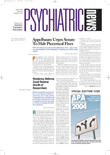A new meta-analysis of serotonin reuptake inhibitors in the treatment of children and adolescents with obsessive-compulsive disorder indicates that each of the drugs studied showed significant and comparable efficacy. However, the drugs differed significantly regarding safety and tolerability.
The analysis appears to be the first to question the conventional wisdom that all SSRIs are comparably effective in the treatment of OCD. Several analyses have been done in adults with OCD, generally suggesting that clomipramine (Anafranil)—an older tricyclic antidepressant that inhibits reuptake of both serotonin and norepinephrine as well as binding to several neuroreceptors—is more effective for OCD than the newer SSRIs that more selectively block serotonin reuptake. Since children had previously been noted to have very similar responses to antiobsession treatment as adults, researchers proposed that clomipramine would be superior to other SSRIs in children with OCD as well.
To test the hypothesis, a multinational team led by Daniel Geller, M.B.B.S., an assistant professor of psychiatry at Harvard Medical School and director of the OCD program at Massachusetts General Hospital, pooled data from 12 studies with a total of 1,044 patients in clinical trials of four newer SSRIs (paroxetine, fluoxetine, fluvoxamine, and sertraline), as well as clomipramine. The studies included four trial designs, four dependent outcome measures, and two types of outcome scores.
Overall, the use of any medication to treat symptoms of OCD in children and adolescents was found to be significant, although modest, with an effect size of 0.46 for the 12 pooled studies. Because the 12 studies used variable methods, including different outcome measures, the pooled effect size was reanalyzed, with each of the 12 studies omitted one at a time. Geller and his colleagues found that no single study skewed the overall average effect size.
However, Geller also analyzed the effect of using each specific outcome measure to determine whether one of the four outcome measures rated the drug effects differently from the others. Interestingly, the investigators determined that the Leyton Obsessional Inventory–Child Version resulted in nonstatistically significant results in the four studies in which it was used.
In those same four studies, children were also rated with the NIMH Global OCD Scale, resulting in statistically significant results in all four, conflicting with the results from the Leyton inventory. One of the four studies also included the Children’s Yale-Brown Obsessive-Compulsive Scale and the Clinical Global Impression of Severity. Both scales also yielded significant results, agreeing with the NIMH Global OCD Scale, but again contradicting the nonstatistically significant results from the Leyton inventory.
The largest difference—indicating the greatest improvement—was seen with clomipramine, confirming the team’s suspicion that the drug would be more efficacious in children, just as it is in adults with OCD. Fluoxetine, sertraline, fluvoxamine, and paroxetine were all more effective than placebo, but not significantly different from one another.
Geller and his colleagues equated the 0.46 effect size for medication overall to an improvement on the Yale-Brown Obsessive Compulsive Scale of about four points.
The team noted that subject-selection bias could “profoundly influence outcomes” in the clinical trials being analyzed—a difficulty seen in all clinical trials of study medications. They cautioned that while it is important to exclude patients from clinical trials who have comorbid medical and psychiatric illness, the resulting study population often does not resemble an actual clinical sample. As such, Geller wrote, “whether the results obtained from these randomized, controlled medication trials apply equally to naturalistic clinical samples remains unknown.”
Despite the team’s finding that clomipramine is the most efficacious medication for children with OCD, Geller cautioned, “it does not follow that clomipramine should be recommended as a treatment of first choice in pediatric OCD patients, due to frequent adverse events.” Clomipramine has been associated with severe side effects, including hypertension, heart-rhythm disturbances, seizure, and liver, kidney, and endocrine dysfunction.
The team did not directly examine differential side-effect profiles in their analysis, although Geller told Psychiatric News, “The comparison would have been helpful, though the method of reporting these may vary from one company to another,” making any analysis indirect.
“Since the SSRIs were statistically indistinguishable from one another with respect to overall effect, a decision to use any one may depend more on adverse-event profiles and individual pharmacokinetic properties than on efficacy,” Geller and his colleagues concluded.
Am J Psychiatry 2003 160 1919
